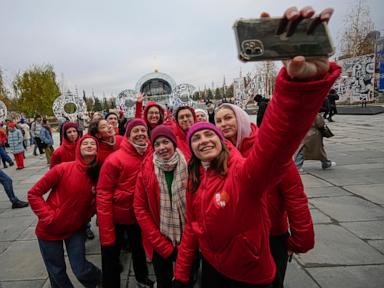MOSCOW — With pointed disdain for the West, Russia on Saturday unveiled a sprawling exposition highlighting the nation’s accomplishments, which will run through the months leading to the presidential election in which Vladimir Putin is widely expected to seek a new term.
Putin issued a decree in March to hold the exposition and some observers have seen it as aimed at creating an ideological framework for his reelection. News reports had suggested he might use the opening to announce his candidacy for the March election, but his spokesman later said he would not attend the event.
Putin has led Russia as president or prime minister since 2000, and reelection would extend his term until 2030.
The event is held at VDNKh, the vast exposition grounds in northern Moscow that was established by Josef Stalin and is renowned for its collection of elaborate Soviet Gothic-style pavilions. The setting plays to many Russians’ nostalgia for the Soviet era and echoes Putin’s drive to restore Russia as a superpower.
Thematically, the exposition focuses on Russia as a country of diverse ethnic groups and cultures unified by a sense of national purpose. It includes displays from each of Russia’s regions, as well as from the Luhansk and Donetsk regions of Ukraine that Russia claims to have annexed, along with an array of presentations on industry, education and technology will be on offer.
It also draws on the view of Russia being in a civilizational battle, a concept that has been in forefront of official discourse since Russia sent troops into Ukraine in February 2022.
“Any provocations and aggressive actions directed against Russia are doomed to failure. Because we are a single people, bound by a common history, fraternal bonds of friendship and mutual understanding,” Putin said in a message marking the opening of the exposition.
In a speech at the show’s opening day, Putin’s close ally Nikolai Patrushev, head of the national security council, amplified the idea.
“In contrast to the West, Russia has offered a civilizational choice based on preserving national sovereignty, mutual respect, equal partnership, traditional family values, protection of religious foundations and the rights of believers, as well as generally accepted norms of morality, ethics and social behavior,” he said.
“Historically, Russia has always been a bone in the throat of the West, interfering with the implementation of its hegemonic plans,” Patrushev said.
